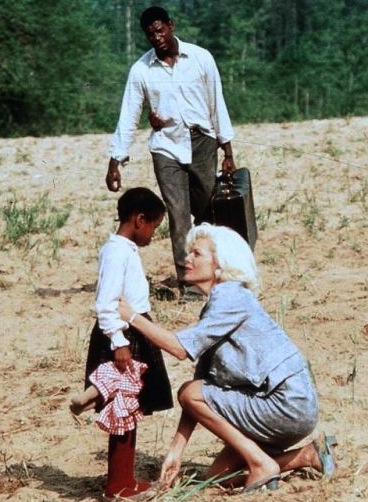Sunday, February 14, 1993.
LOVE FIELD. Written by Don Roos. Music by Jerry Goldsmith. Directed by Jonathan Kaplan. Running time: 104 minutes. Mature with the B.C. classifier's warning "occasional violence and very coarse language."
THE NATIONAL TRAGEDY brings them together.
If John Kennedy had not died in Parkland Hospital, dotty Dallas housewife Louise Irene "Lurene" Hallet (Michelle Pfeiffer) would not be on the Greyhound bus to Washington, D.C. She would never have met Paul Cater (Dennis Haysbert), an African-American single father travelling with his six-year-old daughter, Jonell (Stephanie McFadden).
An anonymous tragedy brings them together. In the darkness of a Tennessee night, a speeding car passes their bus, then crashes into a jack-knifed semi-trailer.
While state troopers are questioning witness Paul, Lurene jumps to the conclusion that he is a kidnapper. She's both right and wrong, and soon the three of them are on the run in a stolen car.
In his superb 1985 book, A Certain Tendency of the Hollywood Cinema, film historian Robert B. Ray looked at movie-making the American way. There is an "industrywide consensus," he said, and it insists on "the conversion of all political, sociological and economic dilemmas into personal melodramas."
For the Boom generation, the Kennedy assassination was a social dilemma of cataclysmic proportions. Director Jonathan Kaplan's well-intended Love Field is yet another attempt to find some meaning in that mind-numbing event.
His vehicle is the melodrama of two people searching for meaning in their lives. An unlikely tale, it gains power and even credence from the larger event providing the emotional backdrop.
As played by the versatile Pfeiffer, Lurene is a great-hearted young wife trapped in an increasingly loveless marriage. Grieving the loss of her own baby, she takes strength from her deep personal identification with First Lady Jacqueline Kennedy (look-alike actress Rhoda Griffis).
Lurene is at Dallas's Love Field on November 22 to see the presidential party arrive. That evening, she makes up her mind to attend JFK's state funeral in Washington.
Paul, we eventually learn, has stolen his daughter from a physically abusive orphanage. Lurene's sincere attempts at colour-blind helpfulness only serve to make his difficult situation more dire.
Without the dramatic resonance of the assassination, Don Roos's screenplay could be a romantic road comedy, full of the "fine messes" into which ditsy do-gooder Lurene gets the travellers.
With it, Kaplan forces us to consider the anguished truth in Paul's rebuff to troubled Lurene. "Don't you dare think we're the same," he says. "Being bored and being black are not the same."
Kaplan, who guided Jodie Foster's Oscar-winning performance in The Accused, effectively states the case against his couple becoming a couple. Then, with attention to the "industrywide consensus," he offers the possibility of a happy ending, something to give individual meaning to unfathomable fate.
It's the Hollywood style and the American way.
The above is a restored version of a Province review by Michael Walsh originally published in 1993. For additional information on this archived material, please visit my FAQ.
Afterword: A California girl with beauty-queen good looks, Michelle Pfeiffer seems to have spent much of her career in roles designed to prove that, yes, she really can act. Sympathetic to her plight, the Academy of Motion Picture Arts and Sciences provided her with Oscar nominations in 1988 (best supporting actress for her role in director Stephen Frears's period piece Dangerous Liaisons); in 1989 (best actress for her unforgettable star turn in The Fabulous Baker Boys); and finally in 1992 (best actress for Love Field). She's even played played Shakespeare (the fairy queen Titania in the 1999 screen adaptation of A Midsummer Night's Dream). Yes, she can act. Now, can I admit that my all-time favourite Pfeiffer performance is Selina Kyle, the Catwoman in 1992's Batman Returns? Meee-ow!
22/11/63 Remembered: Executive Action (1973); Flashpoint (1984); JFK (1991); Ruby (1992); Winter Kills (1979); Killing Kennedy (2013).
